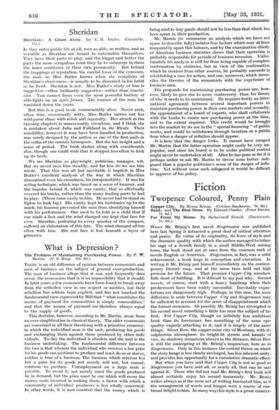Sheridan
Iv they enter public life at all, men as able, as restless, and as versatile as Sheridan are bound to externalize themselves. They have their parts to play, and the bigger and better the parts the more scrupulous must they be to submerge in them the inner semblance of their own personality. But behind the trappings of reputation, the careful tcnue of the cynosure, the man—as Miss Butler knows when she complains of Sheridan's elusiveness—is usually to be discerned in his habit as he lived. Sheridan is not. Miss Butler's study of him is suggestive—often brilliantly suggestive—rather than conclu- sive. You cannot focus even the most powerful battery of side-lights on an ignis fatuus. The essence of the man has vanished down the years.
But this is a good book, commendably alive. Never arch, often wise, occasionally witty, Miss Butler carries out her wild-goose chase with relish and ingenuity. Her attack in the opening chapters is unnecessarily circuitous, and I think she is mistaken about Julia and Falkland in the Rivals. Their sensibility, however it may have been handled in production, was surely designed by the author as one of the first nails in the coffin of the ccrmedie larmoyante. But she has insight and a sense of period. The book dashes along with considerable élan, though one could wish that it stopped less often to kick up its heels.
We see Sheridan as playwright, politician, manager, wit. But we never seen him steadily, and far less do we see him whole. That this was all but inevitable is implicit in Miss Butler's excellent analysis of the way in which Sheridan dramatized even his casualness, his irresponsibility. It was his acting technique, which was based on a sense of humour, and the impulse behind it, which was vanity, that so effectually covered his tracks, rather than the many leading parts he had to play. (Those came easily to him. He never had to stand on tiptoe to look big.) His vanity kept his histrionics up to the mark, his humour prevented the man from identifying himself with his performance. One used to be told as a child that if one made a face and the wind changed one kept that face for ever. Sheridan, posturing to every quarter of the compass, suffered an elaboration of this fate. The wind changed all too often with him. His real face is lost beneath a layer of grimaces.






































 Previous page
Previous page